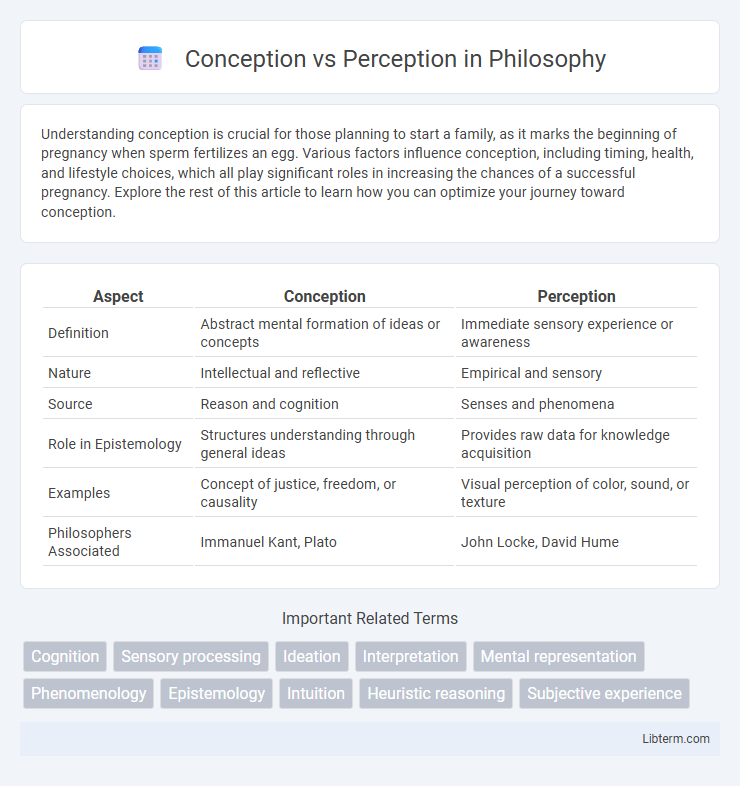Understanding conception is crucial for those planning to start a family, as it marks the beginning of pregnancy when sperm fertilizes an egg. Various factors influence conception, including timing, health, and lifestyle choices, which all play significant roles in increasing the chances of a successful pregnancy. Explore the rest of this article to learn how you can optimize your journey toward conception.
Table of Comparison
| Aspect | Conception | Perception |
|---|---|---|
| Definition | Abstract mental formation of ideas or concepts | Immediate sensory experience or awareness |
| Nature | Intellectual and reflective | Empirical and sensory |
| Source | Reason and cognition | Senses and phenomena |
| Role in Epistemology | Structures understanding through general ideas | Provides raw data for knowledge acquisition |
| Examples | Concept of justice, freedom, or causality | Visual perception of color, sound, or texture |
| Philosophers Associated | Immanuel Kant, Plato | John Locke, David Hume |
Understanding the Basics: Conception and Perception
Conception involves the mental formation of ideas or concepts, serving as the foundation for knowledge acquisition and cognitive processing. Perception refers to the sensory experience and interpretation of stimuli, enabling individuals to recognize and respond to their environment. Understanding the distinction between conception and perception is essential for exploring how humans process information and construct reality.
Defining Conception: Origins of Ideas
Conception refers to the mental process of forming ideas, concepts, or notions by synthesizing sensory input and prior knowledge. It originates from cognitive functions that organize raw data into meaningful representations, enabling abstract thinking and problem-solving. Understanding the origins of ideas within conception highlights how the mind constructs knowledge beyond mere perception, involving imagination and reasoning.
What is Perception? Shaping Reality Through Senses
Perception is the process by which the brain interprets sensory information to construct an understanding of the external world, forming a subjective reality based on sights, sounds, smells, tastes, and touch. This sensory-driven interpretation influences cognitive processes, decision-making, and emotional responses, highlighting the brain's role in filtering and prioritizing stimuli. Understanding perception involves studying neural mechanisms, sensory organs, and psychological factors that shape how individuals experience and respond to their environment.
Key Differences Between Conception and Perception
Conception refers to the mental process of forming abstract ideas or general notions, while perception involves the direct sensory experience of the external world. Key differences include that conception is an internal cognitive function relying on memory and reasoning, whereas perception depends on sensory input and immediate awareness. Conception deals with symbolic representation and interpretation, contrasting with perception's focus on concrete, real-time stimuli.
The Role of Conception in Thought Formation
Conception plays a fundamental role in thought formation by providing the mental framework through which individuals organize and interpret sensory information. Unlike perception, which involves the immediate sensory experience of stimuli, conception allows for abstract thinking, categorization, and the generation of new ideas beyond direct observation. This cognitive process enables problem-solving and reasoning by linking diverse pieces of knowledge into coherent concepts essential for higher-level thinking.
Perception’s Influence on Human Experience
Perception shapes human experience by filtering external stimuli into subjective interpretations that influence emotions, decisions, and behavior. Neural processes and sensory inputs determine how individuals construct reality, with cultural and psychological factors modulating perception's accuracy and bias. Understanding perception's role enhances insights into cognition, empathy, and social interaction.
How Conception and Perception Interact
Conception involves the mental formation of ideas based on abstract reasoning, while perception is the sensory process of acquiring information from the environment. These two interact as perception provides raw sensory data that conception organizes and interprets to form meaningful understanding. This dynamic interplay enables humans to navigate reality by continuously integrating observable stimuli with cognitive frameworks.
Examples from Psychology: Conception vs Perception
Conception involves forming abstract mental representations, such as understanding the concept of justice or love, while perception refers to the immediate sensory experience, like seeing a red apple or hearing a melody. In psychology, experiments on depth perception showcase how sensory input is processed to create a coherent image, distinct from the cognitive conception of space and distance. Studies on cognitive development, such as Piaget's theory, highlight how children's conceptions evolve with experience, contrasting with their initial perceptual interpretations of the world.
Impact on Decision-Making: Conception or Perception?
Perception plays a crucial role in decision-making by shaping how individuals interpret sensory information and environmental cues, often leading to immediate judgments based on subjective experiences. Conception, involving the formation of abstract ideas and concepts, influences decision-making by enabling critical analysis, foresight, and strategic planning beyond initial impressions. Understanding the interplay between perception's real-time impact and conception's reflective processing enhances accuracy and effectiveness in decision outcomes.
Enhancing Awareness: Bridging Conception and Perception
Enhancing awareness involves bridging the gap between conception, the internal understanding or mental model of a concept, and perception, the sensory experience of reality. By aligning cognitive frameworks with sensory inputs, individuals can achieve a more accurate interpretation of their environment, leading to improved decision-making and learning. Technologies like augmented reality and mindfulness practices serve to synchronize conception and perception, fostering greater cognitive clarity and situational awareness.
Conception Infographic

 libterm.com
libterm.com